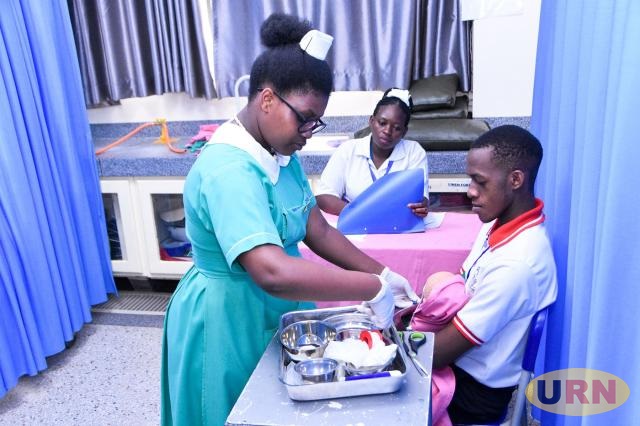
Kampala, Uganda | THE INDEPENDENT | The Uganda Nurses and Midwifery Examination Board (UNMEB) is urging training institutions to establish permanent and improved skills laboratories.
It says the upgrade will enhance the effectiveness of training and reduce the financial burden of practical examinations.
Helen Mukakarisa Kataratambi, the Executive Secretary of UNMEB, emphasized the necessity for institutions to upgrade their skills labs, saying many currently rely on temporary setups during examination periods.
Mukakarisa made the remarks while monitoring the ongoing practical examinations for nurses and midwives by the board alongside Ministry of Education officials. She noted that the lack of adequate skills labs not only impacts the assessment process but is also critical for effective training.
The Executive Secretary further added that the limited number of labs at these schools increases the cost of examinations. This necessitates deploying additional examination officers to monitor students during assessments, as well as other officers to oversee those waiting for their turn.
Skills labs provide students with fundamental training in essential nursing tasks they will routinely perform, such as measuring vital signs, conducting patient interviews, assessing patient conditions, and performing procedures like drawing blood.
These labs often utilize a variety of patient simulator manikins, which can replicate different ages and medical conditions. In each session, students, either individually or in small groups, address scenarios involving these manikins.
These simulations serve a dual purpose: providing hands-on training and also acting as the setting for practical examinations where students’ competencies are assessed.
During the monitoring visit, the team visited Mulago School of Nursing and Midwifery, one of Uganda’s oldest training institutions.
They discovered that the school had two small skills labs, each accommodating only five students at a time. These labs were housed in a building constructed in 1955 when the student population was still low.
Students interviewed at Mulago raised a critical concern about the scarcity of sufficient space and equipment in the skills lab. This shortage often leads to extended examination periods, forcing different groups of students to wait for their turn.
Compounding the issue, regulations require that students remain confined to designated areas to prevent mixing with those who have already completed earlier shifts.
“When the number of students in the institution exceeds the capacity of the skills lab and related resources, the examination process takes longer due to multiple shifts of students. However, in institutions where labs are available and fully equipped, examinations are completed within a limited time frame,” one student expressed.
In contrast, at the Nsambya School of Nursing, there was a spacious and well-equipped skills lab that accommodated more students per round. Surprisingly, Mulago, despite having limited space in the lab, had a higher number of candidates than Nsambya.
Officials monitoring the examinations visibly appreciated the better conditions at Nsambya and noted that all institutions should ideally have similar facilities.
Dr John Chrysostom Muyingo, the State Minister for Higher Education, who was part of the monitoring team acknowledged that the government has received a report on the challenges faced, and efforts are now underway to secure funding. The aim is to expand government training institutions and establish additional skills labs to meet the needs of the growing student population.
Muyingo further stressed that as the government invests in improving skills labs within its institutions, private non-profit and for-profit institutions should follow suit. He emphasized that Uganda requires a strong pool of qualified nurses, and well-equipped skills labs are crucial for achieving this goal.
The minister also emphasized the importance of close collaboration between UNMEB, the ministry, and training institutions. He stressed the need to ensure that the number of student admissions closely aligns with the available resources, such as faculty, lab space, and equipment. This alignment is crucial to facilitate the smooth handling of both training and assessments.
A total of 52,922 nursing and midwifery students from both diploma and certificate programs are participating in the current UNMEB examinations. Week one (June 10-14) Focused on theoretical knowledge through written exams and week two (June 24-28) assessed practical skills through hands-on examinations.
*****
URN
 The Independent Uganda: You get the Truth we Pay the Price
The Independent Uganda: You get the Truth we Pay the Price



